ABIDA RASHEED is perhaps Calicut�s most famous Moplah woman. Not because her husband, Rasheed, is the textile businessman who owns Saree Sellers, a string of showrooms all over the coastal city. Or because the handsome couple have a luxurious bungalow on the outskirts of Calicut which has been featured in interior magazines and besides which, a river flows gently. No, Abida is better known for her outstanding food. She is Calicut�s most recognised Moplah cook.
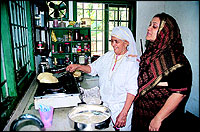 Her cooking is legendary. Malayalis in Calicut wanting to introduce outsiders to the cuisine of the Malabari Muslims ask to be invited to Abida�s home. She is as warm and hospitable as she is talented at putting together a menu of authentic Moplah food. And if you are welcomed to her home, please go, she keeps a good table, and that table will be groaning with the weight of her awesome cuisine!
Her cooking is legendary. Malayalis in Calicut wanting to introduce outsiders to the cuisine of the Malabari Muslims ask to be invited to Abida�s home. She is as warm and hospitable as she is talented at putting together a menu of authentic Moplah food. And if you are welcomed to her home, please go, she keeps a good table, and that table will be groaning with the weight of her awesome cuisine!
Her passion for cooking Moplah food developed when Abida was a child. �My grandmother was a fabulous cook and I have been cooking since I was in the fifth standard,� she said. In 1984, enterprisingly, Abida launched Hot.Dot Foods, a culinary company of limited menus that packaged parathas and chicken biryanis and sold them locally. But she had to close down the company the very next year because she got married. In Rasheed, fortunately, Abida married a husband who was a major foodie. �Rasheed is forever trying out food outside and then coming home and getting me to reproduce it. He even sources the recipes, gets the ingredients, and gives me critical advice,� she said. The good thing about Rasheed�s encouragement was that Abida restarted Hot.Dot Foods and today runs a factory from across her bungalow that employs eight people. She herself is up at 4, cooking parathas, chicken biryani, stuffed mussels, which she wants to export.
 Moplahs are North Kerala�s Malabari Muslims. They trace their roots to Arabs who came to trade here centuries ago in spices and silk and stayed on to take Kerala brides. Moplahs look, to some extent, like Indian Arabs! The men are large and blustery, or small and dark, the more traditional among them dress in white. White lungi and shirt with a turban on the head, and leather sandals on their feet. The women wear scarves. There might not be sandstorms in Calicut, but the turban and the white apparel keeps the Moplah cool in Kerala�s hot and humid climate.
Moplahs are North Kerala�s Malabari Muslims. They trace their roots to Arabs who came to trade here centuries ago in spices and silk and stayed on to take Kerala brides. Moplahs look, to some extent, like Indian Arabs! The men are large and blustery, or small and dark, the more traditional among them dress in white. White lungi and shirt with a turban on the head, and leather sandals on their feet. The women wear scarves. There might not be sandstorms in Calicut, but the turban and the white apparel keeps the Moplah cool in Kerala�s hot and humid climate.
Most men wear moustaches and beards. Unless, of course, they are extremely progressive and educated like Rasheed. But all are fervently religious, and fiercely proud of their Malabari Muslim origin. They pray at the nearby mosque and during the holy month of Ramadan, these Moplahs do all the rozas.
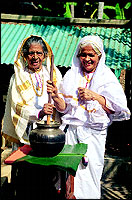 Coming to Moplah food. In the only book on the subject, cookery expert Ummi Abdulla says: Moplah cuisine has a great deal in common with food elsewhere in Kerala in its excessive use of coconut and coconut oil, and in its dependence on rice as the staple item of food. The Arab influence is evident in some of the dishes like Alisa, a wholesome wheat and meat porridge, and the stuffed chicken. The famous biryani must have been brought from Samarkhand by the Moghuls and the indigenous Muslim rulers of Arcot and Mysore, though the Moplah variations are noteworthy. Abida favours a Fish Biryani in which she uses the Seer or Ayakora. It is an expensive fish, between Rs. 160 to 200 a kilo, but it lends itself beautifully to a biryani. �The flesh is tight but it is soft, and it does not break up in cooking,� Abida said. The other biryani is the Chicken Biryani. Mutton is not so popular. Beef and prawns are.
Coming to Moplah food. In the only book on the subject, cookery expert Ummi Abdulla says: Moplah cuisine has a great deal in common with food elsewhere in Kerala in its excessive use of coconut and coconut oil, and in its dependence on rice as the staple item of food. The Arab influence is evident in some of the dishes like Alisa, a wholesome wheat and meat porridge, and the stuffed chicken. The famous biryani must have been brought from Samarkhand by the Moghuls and the indigenous Muslim rulers of Arcot and Mysore, though the Moplah variations are noteworthy. Abida favours a Fish Biryani in which she uses the Seer or Ayakora. It is an expensive fish, between Rs. 160 to 200 a kilo, but it lends itself beautifully to a biryani. �The flesh is tight but it is soft, and it does not break up in cooking,� Abida said. The other biryani is the Chicken Biryani. Mutton is not so popular. Beef and prawns are.
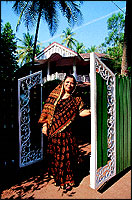 There is a certain variety of dishes that is intrinsically Moplah and recognised as such by all Malayalis � the Pathiri or rice chapati made in many different ways, the Neichoru, an exotic fried rice, and the sweet Mutta Mala or the egg-garland made of the yolks of eggs without a trace of fat. Abida said the Moplah style of cooking is distinctly Yemeni. It is Muslim food but quite unlike the Mughlai cuisines of India from Hyderabad, Lucknow, Kashmir and even Delhi. �Those cuisines are more oily and have heavy and rich gravies,� Abida said. �Moplah food is not rich, we don�t use too many spices, no ginger-garlic paste, we use chilli powder, coriander powder, turmeric, jeera, a few whole spices that we grow. Moplah food, unlike other Mughlai food, will not give you a feeling of fullness at the end of a meal.�
There is a certain variety of dishes that is intrinsically Moplah and recognised as such by all Malayalis � the Pathiri or rice chapati made in many different ways, the Neichoru, an exotic fried rice, and the sweet Mutta Mala or the egg-garland made of the yolks of eggs without a trace of fat. Abida said the Moplah style of cooking is distinctly Yemeni. It is Muslim food but quite unlike the Mughlai cuisines of India from Hyderabad, Lucknow, Kashmir and even Delhi. �Those cuisines are more oily and have heavy and rich gravies,� Abida said. �Moplah food is not rich, we don�t use too many spices, no ginger-garlic paste, we use chilli powder, coriander powder, turmeric, jeera, a few whole spices that we grow. Moplah food, unlike other Mughlai food, will not give you a feeling of fullness at the end of a meal.�
 What Ummi Abdulla fails to mention, however, and what Madhur Jaffrey (that other great writer on Indian food) does in her book A Taste of India, is that the Moplah cooking is generally done by traditional women cooks called �Ethathas� who dress with their heads covered by long, white scarves and their ears festooned with earrings. Abida, though a brilliant cook herself, has a pair of �ethathas� in her modern home. �Their names are Aisa and Ummaity,� she said, introducing the shy women who have been with her from young, her youth and theirs. �They were trained by my grandmother and are now like part of my own family.� Aisa and Ummaity run the traditional and contemporary kitchens in Abida�s home. There is a gas range and also a woodfire oven. Abida does a lot of her cooking on wood and coal. �This is how traditional Moplah familes cook,� she said.
What Ummi Abdulla fails to mention, however, and what Madhur Jaffrey (that other great writer on Indian food) does in her book A Taste of India, is that the Moplah cooking is generally done by traditional women cooks called �Ethathas� who dress with their heads covered by long, white scarves and their ears festooned with earrings. Abida, though a brilliant cook herself, has a pair of �ethathas� in her modern home. �Their names are Aisa and Ummaity,� she said, introducing the shy women who have been with her from young, her youth and theirs. �They were trained by my grandmother and are now like part of my own family.� Aisa and Ummaity run the traditional and contemporary kitchens in Abida�s home. There is a gas range and also a woodfire oven. Abida does a lot of her cooking on wood and coal. �This is how traditional Moplah familes cook,� she said.
Abida and Rasheed entertain frequently, fortunately, and half of Calicut must have at some time or the other sampled her Moplah cooking. Like all Malabari Muslims, they are welcoming and hospitable people, cooking and feeding people is the main occupation. Theirs is a strong matriarchal society in which the new bridegroom comes to stay with his wife in her mother�s house. He is treated to the best of food by the mother-in-law. This tradition has been continuing for centuries and entire wedding feats are prepared for the �Mapillai� or bridegroom including breakfasts of stuffed chicken and pathiris, curries, puttus with Kerala banana, some form of fish alternated with meat and the main wedding dish, a stuffed goat�s head! �It is the custom Rasheed was married into and it is a custom I will have to keep up when my three daughters Aisha, Fatima and Nafisa bring their own �Mapillais� home,� said Abida.
Abida Rasheed may be contacted on telephone number (0495) 2766756.
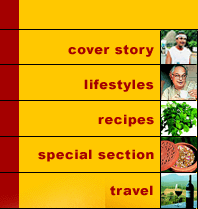
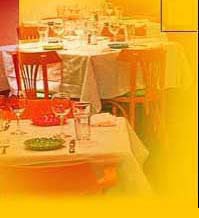



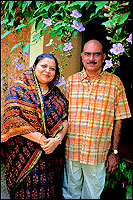 Arab Flavour To Moplah Food
Arab Flavour To Moplah Food
 Her cooking is legendary. Malayalis in Calicut wanting to introduce outsiders to the cuisine of the Malabari Muslims ask to be invited to Abida�s home. She is as warm and hospitable as she is talented at putting together a menu of authentic Moplah food. And if you are welcomed to her home, please go, she keeps a good table, and that table will be groaning with the weight of her awesome cuisine!
Her cooking is legendary. Malayalis in Calicut wanting to introduce outsiders to the cuisine of the Malabari Muslims ask to be invited to Abida�s home. She is as warm and hospitable as she is talented at putting together a menu of authentic Moplah food. And if you are welcomed to her home, please go, she keeps a good table, and that table will be groaning with the weight of her awesome cuisine! Moplahs are North Kerala�s Malabari Muslims. They trace their roots to Arabs who came to trade here centuries ago in spices and silk and stayed on to take Kerala brides. Moplahs look, to some extent, like Indian Arabs! The men are large and blustery, or small and dark, the more traditional among them dress in white. White lungi and shirt with a turban on the head, and leather sandals on their feet. The women wear scarves. There might not be sandstorms in Calicut, but the turban and the white apparel keeps the Moplah cool in Kerala�s hot and humid climate.
Moplahs are North Kerala�s Malabari Muslims. They trace their roots to Arabs who came to trade here centuries ago in spices and silk and stayed on to take Kerala brides. Moplahs look, to some extent, like Indian Arabs! The men are large and blustery, or small and dark, the more traditional among them dress in white. White lungi and shirt with a turban on the head, and leather sandals on their feet. The women wear scarves. There might not be sandstorms in Calicut, but the turban and the white apparel keeps the Moplah cool in Kerala�s hot and humid climate.  Coming to Moplah food. In the only book on the subject, cookery expert Ummi Abdulla says: Moplah cuisine has a great deal in common with food elsewhere in Kerala in its excessive use of coconut and coconut oil, and in its dependence on rice as the staple item of food. The Arab influence is evident in some of the dishes like Alisa, a wholesome wheat and meat porridge, and the stuffed chicken. The famous biryani must have been brought from Samarkhand by the Moghuls and the indigenous Muslim rulers of Arcot and Mysore, though the Moplah variations are noteworthy. Abida favours a Fish Biryani in which she uses the Seer or Ayakora. It is an expensive fish, between Rs. 160 to 200 a kilo, but it lends itself beautifully to a biryani. �The flesh is tight but it is soft, and it does not break up in cooking,� Abida said. The other biryani is the Chicken Biryani. Mutton is not so popular. Beef and prawns are.
Coming to Moplah food. In the only book on the subject, cookery expert Ummi Abdulla says: Moplah cuisine has a great deal in common with food elsewhere in Kerala in its excessive use of coconut and coconut oil, and in its dependence on rice as the staple item of food. The Arab influence is evident in some of the dishes like Alisa, a wholesome wheat and meat porridge, and the stuffed chicken. The famous biryani must have been brought from Samarkhand by the Moghuls and the indigenous Muslim rulers of Arcot and Mysore, though the Moplah variations are noteworthy. Abida favours a Fish Biryani in which she uses the Seer or Ayakora. It is an expensive fish, between Rs. 160 to 200 a kilo, but it lends itself beautifully to a biryani. �The flesh is tight but it is soft, and it does not break up in cooking,� Abida said. The other biryani is the Chicken Biryani. Mutton is not so popular. Beef and prawns are. There is a certain variety of dishes that is intrinsically Moplah and recognised as such by all Malayalis � the Pathiri or rice chapati made in many different ways, the Neichoru, an exotic fried rice, and the sweet Mutta Mala or the egg-garland made of the yolks of eggs without a trace of fat. Abida said the Moplah style of cooking is distinctly Yemeni. It is Muslim food but quite unlike the Mughlai cuisines of India from Hyderabad, Lucknow, Kashmir and even Delhi. �Those cuisines are more oily and have heavy and rich gravies,� Abida said. �Moplah food is not rich, we don�t use too many spices, no ginger-garlic paste, we use chilli powder, coriander powder, turmeric, jeera, a few whole spices that we grow. Moplah food, unlike other Mughlai food, will not give you a feeling of fullness at the end of a meal.�
There is a certain variety of dishes that is intrinsically Moplah and recognised as such by all Malayalis � the Pathiri or rice chapati made in many different ways, the Neichoru, an exotic fried rice, and the sweet Mutta Mala or the egg-garland made of the yolks of eggs without a trace of fat. Abida said the Moplah style of cooking is distinctly Yemeni. It is Muslim food but quite unlike the Mughlai cuisines of India from Hyderabad, Lucknow, Kashmir and even Delhi. �Those cuisines are more oily and have heavy and rich gravies,� Abida said. �Moplah food is not rich, we don�t use too many spices, no ginger-garlic paste, we use chilli powder, coriander powder, turmeric, jeera, a few whole spices that we grow. Moplah food, unlike other Mughlai food, will not give you a feeling of fullness at the end of a meal.�  What Ummi Abdulla fails to mention, however, and what Madhur Jaffrey (that other great writer on Indian food) does in her book A Taste of India, is that the Moplah cooking is generally done by traditional women cooks called �Ethathas� who dress with their heads covered by long, white scarves and their ears festooned with earrings. Abida, though a brilliant cook herself, has a pair of �ethathas� in her modern home. �Their names are Aisa and Ummaity,� she said, introducing the shy women who have been with her from young, her youth and theirs. �They were trained by my grandmother and are now like part of my own family.� Aisa and Ummaity run the traditional and contemporary kitchens in Abida�s home. There is a gas range and also a woodfire oven. Abida does a lot of her cooking on wood and coal. �This is how traditional Moplah familes cook,� she said.
What Ummi Abdulla fails to mention, however, and what Madhur Jaffrey (that other great writer on Indian food) does in her book A Taste of India, is that the Moplah cooking is generally done by traditional women cooks called �Ethathas� who dress with their heads covered by long, white scarves and their ears festooned with earrings. Abida, though a brilliant cook herself, has a pair of �ethathas� in her modern home. �Their names are Aisa and Ummaity,� she said, introducing the shy women who have been with her from young, her youth and theirs. �They were trained by my grandmother and are now like part of my own family.� Aisa and Ummaity run the traditional and contemporary kitchens in Abida�s home. There is a gas range and also a woodfire oven. Abida does a lot of her cooking on wood and coal. �This is how traditional Moplah familes cook,� she said.